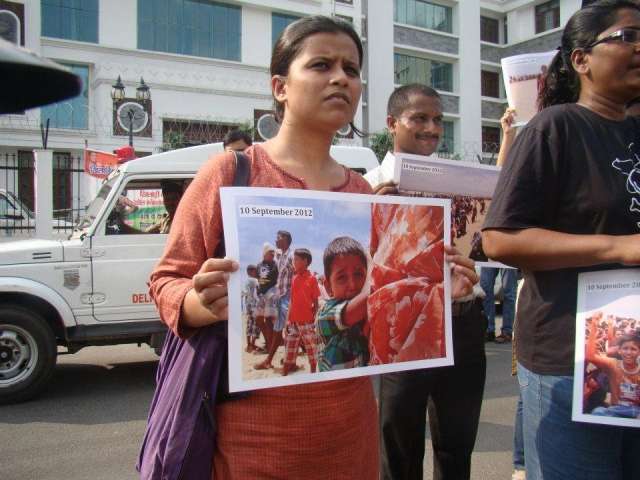http://www.nzherald.co.nz/storydisplay.cfm?storyID=3605297&thesection=news&t
hesubsection=world
29.10.2004
The first scientific study of the human cost of the Iraq war suggests that at least 100,000 civilians have lost their lives since their country was invaded in March 2003.
More than half of those who died were women and children killed in air strikes, researchers say.
Previous estimates have put the Iraqi death toll at around 10,000 – ten times the 1,000 members of the British, American and multi-national forces who have died so far.
But the study, published in The Lancet, suggested that Iraqi casualties could be as much as 100 times the coalition losses. It was also savagely critical of the failure by coalition forces to count Iraqi casualties.
The figures provoked a furious response last night in West-minster. Clare Short, the former cabinet minister who resigned over the war, said: "It is really horrifying. When will Tony Blair stop saying it is all beneficial for the Iraqi people since Saddam Hussein has gone? How many more lives are to be taken? It is no wonder, given this tragic death toll, that the resistance to the occupation is growing.
"We have all relied on Iraqi body counts from media reports. That is clearly an under-estimate and this shows that it was a very big under-estimate. It is truly dreadful. Tony Blair talks simplistically about it getting better in Iraq. These figures prove it is just an illusion."
MPs said the assault on Fallujah expected after the US presidential election next Tuesday would add to the growing death toll among civilians. The figures are certain to provoke fresh demands at the Commons next week for Mr Blair to avoid further civilian deaths.
Alan Simpson, a member of Labour Against the War, said: "Iraq has not seen this scale of slaughter since its war with Iran. At some point, the slaughter of civilians in the name of peace has to become a crime of war. This is not a matter of indifference but criminality. These figures are horrific, but it is a scandal that the world remains silent."
A spokesperson for the Stop the War Coalition said: "The number of dead has exceeded even our worst fears. This war has been shown to be based on lies and to be illegal. It now turns out to be one of the bloodiest in modern times. We must withdraw our troops now and allow the Iraqis to run their own country."
Public health experts from the United States and Iraq who carried out a survey of 1000 households in 33 randomly selected neighbourhoods of the country in September say that heart attacks, strokes and chronic illness were the main causes of death before the invasion. Afterwards, violence was the main cause of death.
Violent deaths were reported from 15 of the 33 neighbourhoods and the risk was 58 times higher in the period after the invasion than before it.
Les Roberts of the Bloom-berg School of Public Health at Johns Hopkins University in Baltimore, Maryland, said: "Making conservative assumptions, we think that about 100,000 excess deaths or more have happened since the 2003 invasion of Iraq. Violence accounted for most of the excess deaths, and air strikes from coalition forces accounted formost violent deaths."
The Lancet, which published the research in its online edition yesterday, said it was "a remarkable piece of work by a courageous team of scientists," which had been completed under testing circumstances.
More households in more neighbourhoods would have improved the precision of the findings but only at "an enormous and unacceptable risk to the team of interviewers who gathered the data."
Richard Horton, the editor, said: "Despite these challenges, its central observation – namely that civilian mortality since the war has risen due to the effect of aerial weaponry – is convincing. This result requires an urgent political and military response if the confidence of ordinary Iraqis in the mostly American-British occupation is to be restored."
The researchers recruited seven Iraqi team members who were willing to risk their lives to interview households about deaths that occurred from January 2002 to March 2003 and from March 2003 to September 2004.
In the 988 households visited, which were randomly selected, there were 46 deaths in the 14.6 months before the invasion and 142 deaths in the 17.8 months after it.
Of the 142 deaths, half (73) were caused by violence. More than two-thirds of these violent deaths – 52 – happened in the Fallujah area, scene of the heaviest fighting. The researchers say this makes Fallujah a "statistical outlier" which may not be representative of the rest of Iraq. They therefore excluded it from their calculations.
The researchers are savagely critical of the US General Tommy Franks for his widely quoted remark that "we don’t do body counts". They say that the Geneva Convention requires occupying forces to protect the civilian population, and add the fact that more than half of the deaths caused by them were women and children is "cause for concern".
The Lancet said it had received the study at the beginning of October and it had been "extensively peer-reviewed, revised and edited". It had been fast-tracked to publication "because of its importance to the evolving security situation in Iraq".









